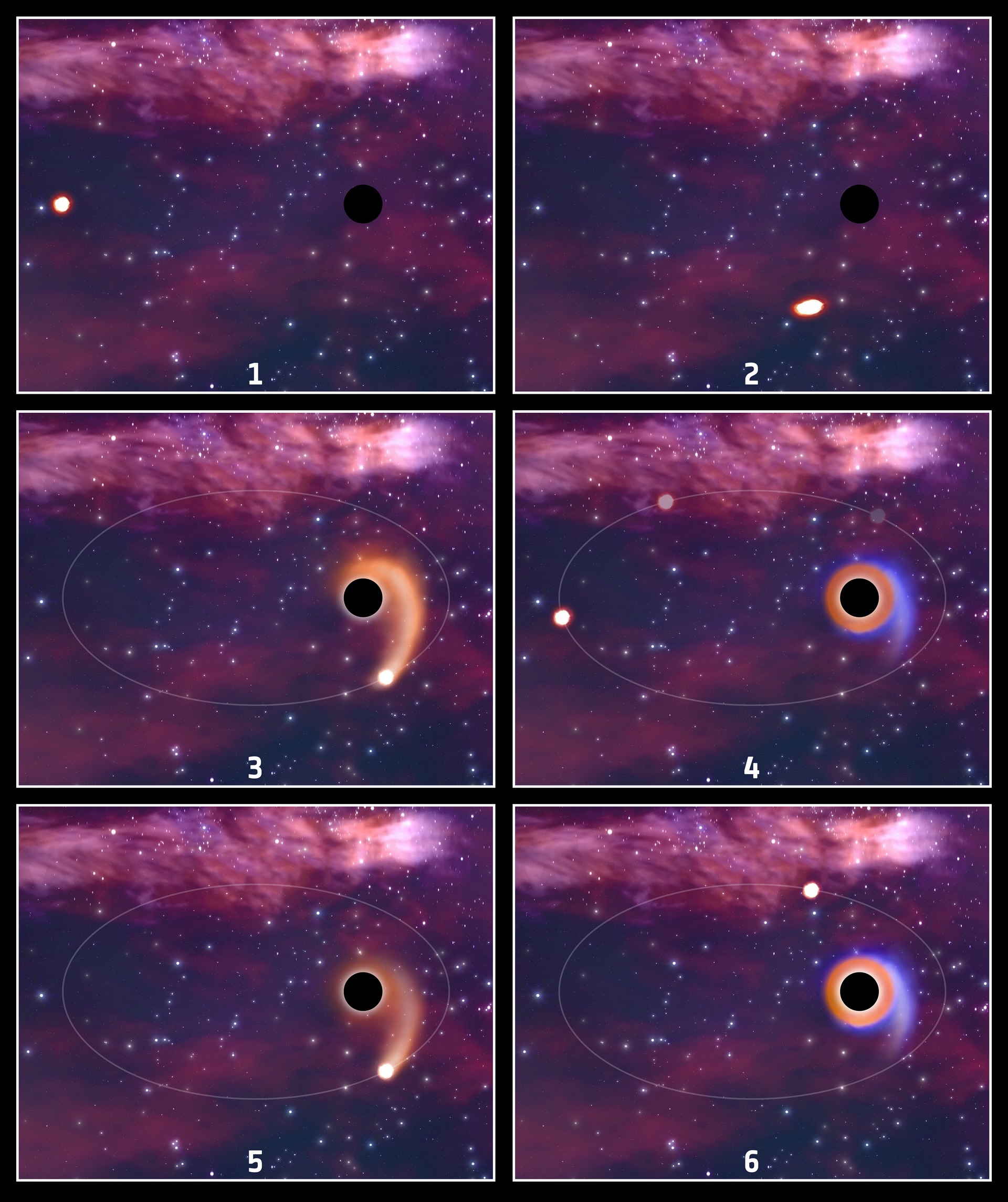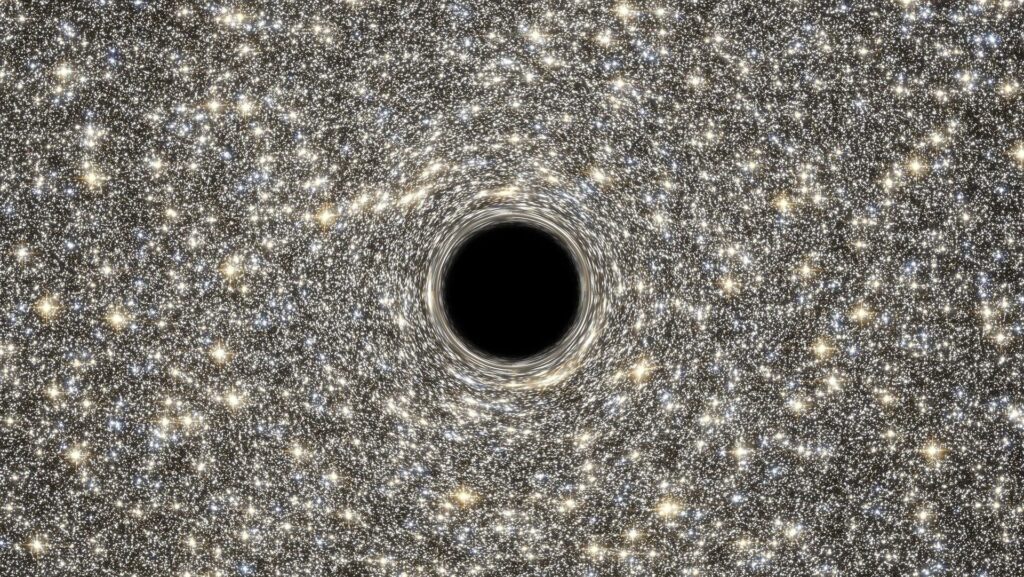Thank your black hole lucky stars. Mysterious, frightening, and endlessly fascinating, these extreme objects are the gravitational anchors of all large galaxies, including our own, and help control star formation throughout the universe. They are the darkest objects in the universe, yet curious Earthlings are drawn to them like moths to a 100,000 solar mass flame.
In his new book, Facing Infinity: Black Holes and Our Place on Earth (The Experiment, 2025), science writer and physicist Jonas Enander takes us on a journey through time and space to uncover the history, science, and enduring mysteries of black holes. From an observatory atop a Hawaiian volcano that helped capture the historic first image of a black hole to a World War I battlefield in France where one of the most important astrophysical equations was devised, Enander speaks with Nobel Prize winners and retraces the footsteps of physics’ greatest thinkers who helped put these gigantic cosmic objects into a concrete human context.
The journey begins with a horrifying ending, with the hapless astronaut falling into the mouth of a black hole. Read an exclusive excerpt from “Facing Infinity” below.
you may like
The light blinds you.
You raise your hands to protect your eyes, allowing shards of light to filter through your fingers. White, blue and red stars shine brightly in the darkness.
you are floating in space. There is no top or bottom.
Thick white gloves cover his hands. These are part of the space suit and provide the only protection from the deadly vacuum that surrounds them.
You lower your hand and narrow your eyes. I see darkness in the starry sky in front of me. There are no stars there. There is no light, only a cold, black void, a black hole.
A black hole is a place in space with a gravitational force so strong that no light can escape from it. That’s why black holes are dark. However, darkness not only signifies the absence of light, but also represents the limits of knowledge. No particles, radiation, or other information can leave a black hole. If you want to know what’s going on in the dark, you have to go straight into it.
I realized that the darkness in front of me was growing bigger. You are falling towards it and there is nothing you can do to stop yourself. There are no spaceships, no rockets, and no way to change course.
you may like
Darkness can be both threatening and alluring at the same time. Like the explorers of old, you are venturing into the unknown. You will find out what is happening in the strangest places in the universe, places no one has ever been.
But there is a difference between you and those adventurers. After exploring faraway places, they could return home and describe what they saw. You will no longer be able to go back in time and tell your friends what you experienced. Once you fall into a black hole, there is no turning back. That gravitational pull is too strong. The darkness will consume you forever.
All I could feel was the spacesuit against my body and all I could hear was my own breathing, but as darkness deepened I began to feel a thud, which grew louder. I realized that it was the sound of my heart.
Jonas Enander, Facing Infinity
You are about to fall into an abyss of spacetime that has a huge gravitational pull. But falling into space is not the same as falling to Earth. On Earth, you can feel the air rushing over your face and hear the sound of your clothes blowing in the wind. However, empty space has no air or sound. All I could feel was the spacesuit against my body and all I could hear was my own breathing, but as darkness deepened I began to feel a thud, which grew louder. The closer you get to the black hole, the more you realize that it is the sound of your own heart. Its heartbeat becomes more and more intense. It’s as if your mind is afraid of what will happen in the dark and knows that you have to sacrifice something in order to see what is happening inside.
Knowledge is costly. The more knowledge you have, the higher the price. To find out what is happening in one of the darkest and strangest places in the universe, you will have to pay the highest price – your life.
The point at which this happens depends on the size of the black hole. The bigger it is, the longer it can survive. The black hole you’re heading toward is about the same size as our solar system. You can pass through its surface without pain, but your life will be over in just a few hours.

Your field of vision becomes increasingly occupied by a darker orb. As the darkness deepens, the light around you appears to change. You’ll see multiple copies of the light from the star appear on either side of the black hole. At the same time, the starlight becomes brighter and appears to be compressed along the edge of the black hole. You realize that darkness controls light. The black hole’s powerful gravity causes the star’s light to travel along a unique path, doubling its brightness. Phantom stars form in space, like mirages in the desert. These strange star doubles will confuse you. You want to tell your friend how the approaching darkness fills you with fear, how the starlight is distorted, and how helpless you are. But even if you have a radio transmitter, you won’t be able to send messages to your friends after passing through the event horizon. He must endure his final moments alone in the darkness.
Deep in the abyss there are points so dense that it is difficult to understand what is happening there. This point is called a singularity. Everything that passes through the event horizon eventually reaches a singularity. There, all matter and all light is concentrated in a state so distorted that even space and time seem to cease to exist.
We pick up speed into the darkness. There’s nothing you can do to avoid it. You turn your head and look around. The space behind you becomes darker and darker. We lose the ability to orient ourselves. We don’t know where we came from or how far away we are from the black hole. Are you in it yet? you don’t know There is no sign on the event horizon that says, “You are now passing the point of no return.”
…Everything in your body is brought out, from your skeleton, tendons, and muscles to your nerves, cells, and DNA.
Jonas Enander, Facing Infinity
Dark spheres appear to surround you on all sides. You flail your arms and legs in a desperate attempt to escape your journey to the singularity, but it’s pointless. There is no escaping the singularity. All that happens is that you start sweating.
Close your eyes, take a deep breath, and think about what awaits you. As you head toward the black hole feet first, your lower body will feel more force than your upper body. You start to pull away. But it doesn’t happen the same way as on a torture rack. Instead, everything in your body is brought out, from your skeleton, tendons, and muscles to your nerves, cells, and DNA. Fortunately, you hardly feel anything when it happens. From the moment you first notice the pain coursing through you, you are debilitated in less than a second. But unlike Earth, where you can bury a person’s corpse, you will be left with nothing. Your body dissolves into darkness.
The smell of your own sweat fills your spacesuit. I try to take a deep breath, but I can hear myself breathing faster and faster. The pain runs from my feet to my head. Your body tenses every muscle in an attempt to stop itself from tensing up.
you open your eyes. The light of a billion stars will blind you. They are outside the black hole, but their light is concentrated in a thin ring inside it. The ring is sandwiched between the front and back darkness. You are in the center of the ring.
The last second of your life will be gone before you can scream.
You have been torn apart by darkness.
Excerpt from Facing Infinity: “Black Holes and Our Place on Earth” © Jonas Enander, 2025. Translation copyright © Nichola Smalley, 2025. Reprinted with permission of the publisher. The Experiment. Available wherever books are sold.
Source link

